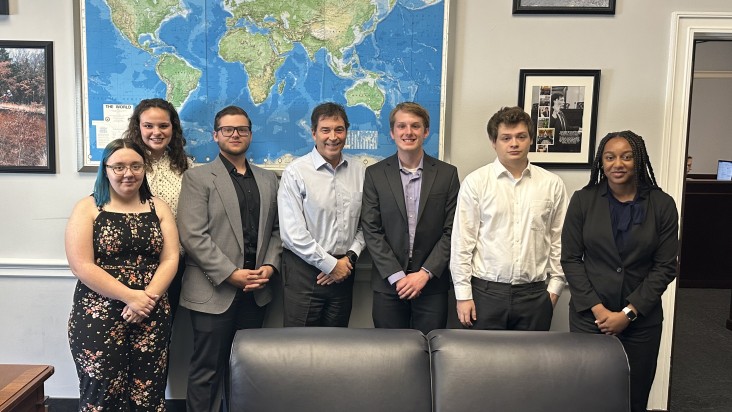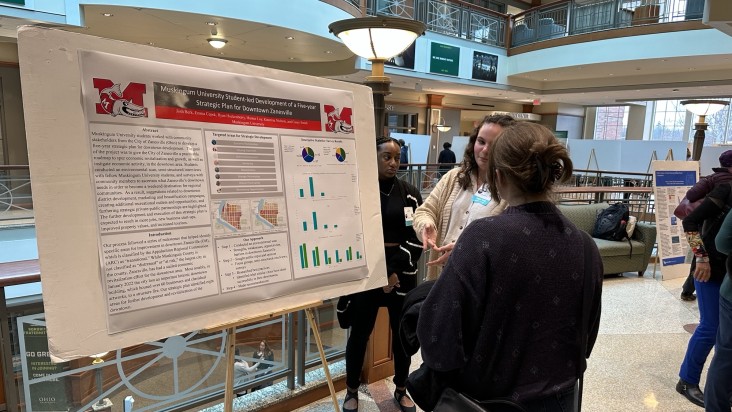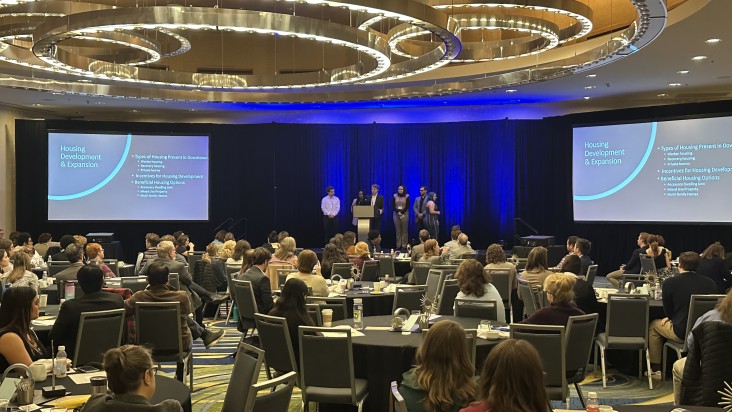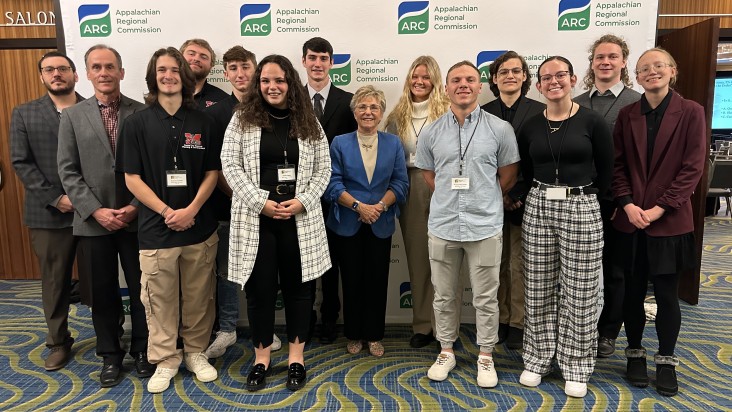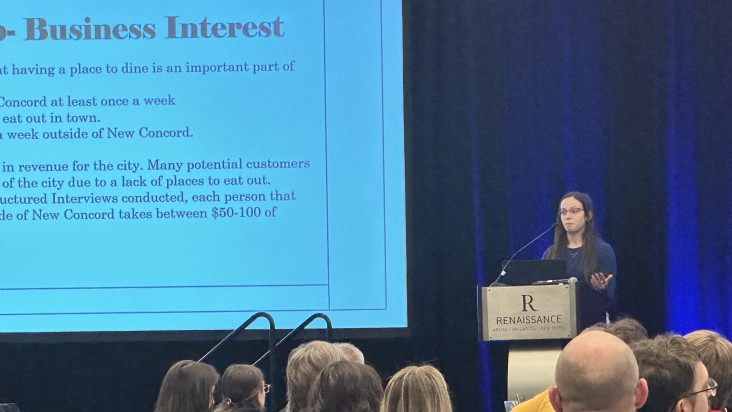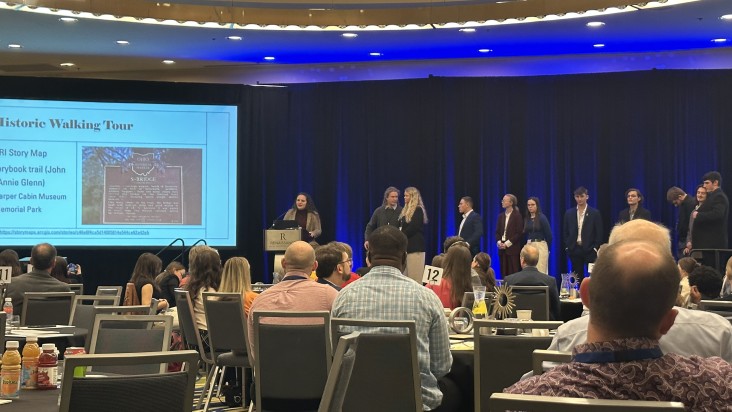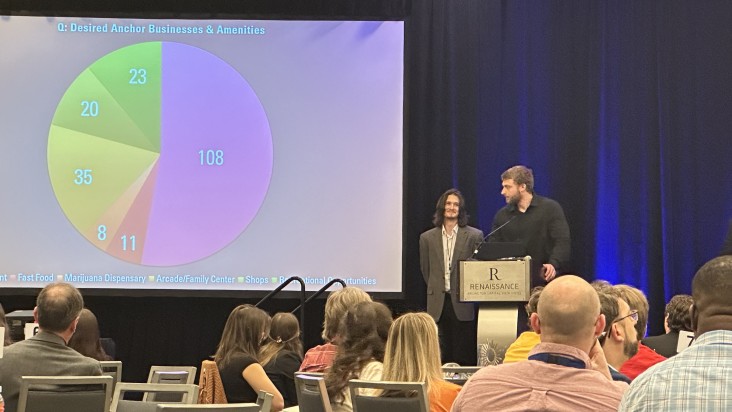Bright Minds, Big Impact

Muskingum University is committed to providing students with opportunities to make a genuine impact on campus and in the community through relationships with faculty, students, family, and their community. One of the main ways they have implemented this part of the institution’s mission is through the creation of the Center for Regional Planning and Development.
The Center was established in 2005 by Dr. Walter Huber. He created the vision for student involvement and impact on campus through the organization. He began collaborating with Dr. Stephen Van Horn through the application of courses that he offers as a Geology professor. "I was drawn to the Center due to my interest in GIS (Geographic Information System) and how that plays a crucial role in developing towns and cities," said Van Horn.
The Center has partnered with various surrounding communities such as Zanesville, Cambridge, and New Concord. "It was important to me to be able to impact our surrounding communities through GIS to revitalize tourism," said Van Horn.
The Center partnered with Cambridge and Zanesville to develop a crime map. "It was interesting to work on this project with students to develop a crime map so that community members are aware and proactive," said Van Horn.
Dr. William Toombs came to Muskingum University as a professor in the Political Science department. Soon after he started, he began working alongside Dr. Van Horn and the students involved with the Center. "I began my career in a nonprofit, so I had a lot of interest in impacting the community through nonprofit organizations, with the primary initiative to make a difference. I knew that I needed to mentor the students as a part of the Center because it is critical to have hands-on experience in this field," said Toombs.
Downtown Zanesville experienced devastation due to a fire that destroyed many recreational buildings, encompassing most of the art and music of downtown. "Zanesville wanted to restore these buildings and bring culture back to the downtown area, so it was the perfect opportunity to partner with them to revitalize their tourism," said Toombs.
Through the Center's partnership with Zanesville during the 2022-2023 academic year, they developed a five-year strategic plan to revitalize the downtown district and restore the lost buildings' history. "It was an exceptional feeling to bring back life to a community so close to Muskingum," said Toombs.
Dr. Toombs teaches a Regional Planning course with three credit hours devoted to the Center's projects. Dr. Van Horn teaches an Introduction to Geographic Information course with a portion dedicated to developing virtual story-telling maps through GIS.
The professors initially chose the students who participated in the Center; however, Dr. Toombs said he wanted a broader group of students for the New Concord project. By doing so, the students were either chosen or volunteered. "As professors, we strive to allow students to achieve a high-impact experience at Muskingum. That is why it was important to me to broaden the students' group. More importantly, we could enrich discussion through more perspectives and ideas, allowing for a fully impactful experience," said Toombs.
This year, the Center partnered with the Village of New Concord to conduct a community needs assessment to improve walkability and access to the Village's downtown business district. Through this, they highlight local landmarks, enhance wellness and eco-tourism, improve signage, and create a digital story map. "The students have full control over the ideas that we implement into New Concord. As professors, we are here to mentor them and provide guidance through the extensive process of formulating and presenting these ideas to the Village," said Toombs.
The Center received a $2,000 grant from the Appalachian Regional Commission (ARC) to support the project. "With the grant money, $1,500 will go towards signage and $500 towards brochures. The signage will be placed throughout downtown to improve walking and incorporate educational details about the historical landmarks," said Toombs.
The students read books on conducting community assessments, developing destination brands for small communities, and building a more resilient downtown. "At the beginning of August 2023, I met with the community stakeholders to identify potential candidates who would participate in the weekly meetings to help the group of students align their assessment with the partners' desires," said Toombs.
After the students conducted the community needs assessment, they presented it to the Village with the intention of increasing visitors, revenue, and business development in the area. "Our goal is to create a more resilient and sustainable local economy for the Village of New Concord and Muskingum University," said Van Horn.
Based on the project summary created by the students, Dr. Toombs and Dr. Van Horn, the four goals of the project were: "conduct student research in an ARC-designated transitional community and provide research opportunities for students, most of whom are Appalachian natives and residents; to experience various parts of the Region and the work of the ARC; utilize community investment to improve walkability, wellness, and economic vitality;, increase access to cultural and natural resources to support tourism; and provide opportunities for students to develop leadership, civic capacity, and communication skills."
The students involved in the Center had the opportunity to travel to Washington D.C to present their project on the Village of New Concord along with the implementation plan. Likewise, they watched presentations of students from different universities striving to impact their communities. "It was an incredible experience for the students. They presented to Congressman Troy Balderson and later met with Brad DeHays ’02," said Van Horn. DeHays is the founder and president of Connect Real Estate and Connect Construction located in Columbus, OH.
Besides presenting their project, it allowed the students to create relationships and network with empowering individuals who devote their careers to creating change through ARC. "It was amazing to watch our students present and to create a strong relationship with them through sightseeing at our nation's capital. Also, watching them interact with other students to learn about their projects to hopefully bring back to Muskingum to embark on a change in our university and community," said Toombs.
The individuals who are a part of the Center for Regional Planning and Development will continue to strive to create positive change through their accomplishments and develop lasting relationships with community partners. Muskingum University will continue to be a place of high-impact experiences for past, present, and future students.
